You've probably heard of pinworms, those tiny parasites that sneak into the intestines of your bearded dragon, causing them discomfort and health issues. But what exactly are these elusive creatures, and how do they manage to infiltrate the lives of these reptiles? Understanding the lifecycle and impact of pinworms is important, especially if you're aiming to provide the best care for your scaly friend. Symptoms like weight loss and lethargy can be subtle, yet they signal a deeper problem that requires attention. Let's explore the insidious world of pinworms together, uncovering how these parasites operate and what you can do to protect your bearded dragon from their grasp.
Key Takeaways
- Pinworms are small intestinal parasites that infect bearded dragons, leading to malnutrition and weakened immunity.
- They reproduce by laying eggs that are expelled and then ingested again, completing their lifecycle.
- Symptoms of pinworm infection include weight loss, lethargy, decreased appetite, and changes in stool.
- Diagnosis is usually confirmed through fecal exams, where yellowish pinworm eggs can be identified under a microscope.
- Treatment often involves medication like fenbendazole, along with improved habitat cleanliness and dietary adjustments.
Understanding Pinworms
Pinworms are tiny parasites that often inhabit the intestines of bearded dragons, affecting their health to a great extent. These small nematodes thrive in environments where they can feed on the ingesta within the large intestine of your infected reptile. Understanding their lifecycle is important; it's essential, which means the eggs are passed through the intestinal tract, only to be ingested once more by the reptile, continuing the cycle of infection.
When you're caring for a bearded dragon, it's necessary to recognize the impact pinworms can have. They're not just a minor inconvenience; they can lead to significant health issues, including malnutrition, a weakened immune system, gastrointestinal disturbances, and even weight loss. This highlights the importance of not only keeping an eye out for symptoms but also implementing preventive measures.
To protect your bearded dragon from these pesky parasites, regular deworming schedules and stringent husbandry practices are non-negotiable. Maintaining cleanliness in their habitat and ensuring a balanced diet can also reduce the chances of your reptile becoming an infected host. Addressing pinworms with the seriousness they warrant is the first step in safeguarding the health and well-being of your bearded dragon.
Identifying Pinworm Symptoms
To recognize a pinworm infection in your bearded dragon, watch for symptoms such as weight loss, lethargy, and a decrease in appetite. These signs are your first clues that something might be off with your scaly friend. Weight loss, in particular, is a vital indicator, as it directly impacts your bearded dragon's overall health and energy levels.
Beyond these initial symptoms, you should also pay close attention to changes in stool consistency and frequency. If you notice that your bearded dragon's stools are less consistent than usual or if there's a change in how often they're going, it could be a sign of pinworms wreaking havoc in their digestive system.
Another telltale sign of a pinworm infection is irritation around the cloaca area, accompanied by signs of discomfort. Your bearded dragon might show this through unusual postures or behaviors aimed at alleviating the irritation.
Lastly, dehydration and a general decline in health can also point towards a pinworm infection. These symptoms, coupled with regular fecal exams, are essential for early detection and prompt treatment, helping to make sure your bearded dragon stays healthy and happy.
Diagnosis of Pinworms
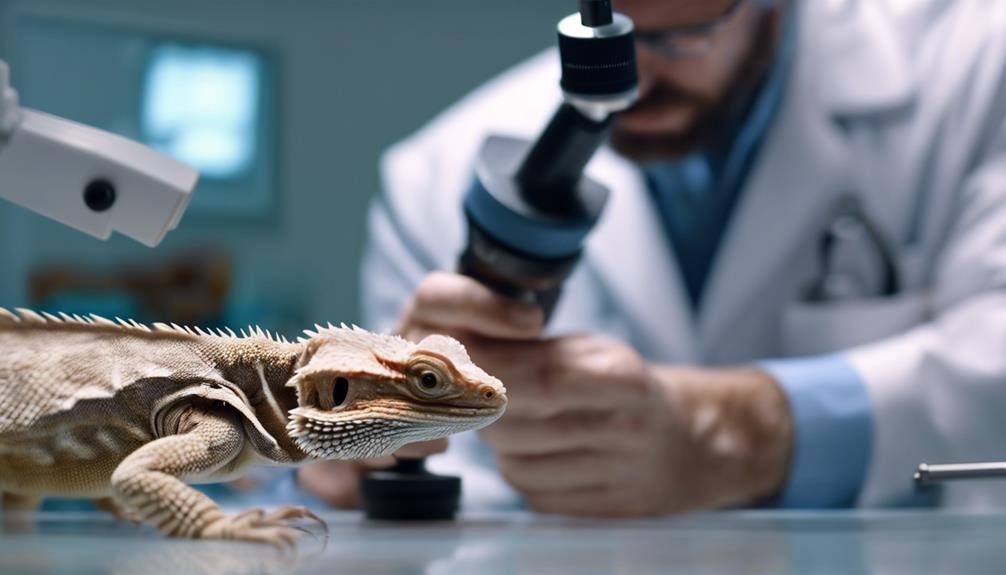

After spotting the symptoms of pinworms in your bearded dragon, it's essential to confirm the diagnosis through fecal exams.
By conducting a fecal float test, a vet can spot the distinctive yellowish to yellow-brown eggs under a microscope, indicating an active infection.
This step is important in evaluating the severity of the infestation and planning the appropriate treatment.
Identifying Pinworm Symptoms
Identifying symptoms such as lethargy, loss of appetite, and weight loss in your bearded dragon may signal a pinworm infection. These signs might seem subtle at first, but they're critical indicators of potential health issues. Pinworm infections can sometimes fly under the radar, showing no obvious symptoms.
However, when your bearded dragon starts showing a loss of appetite or begins to lose weight, it's time to take action. Early detection of these symptoms is key to getting your pet the prompt treatment they need. Although diagnosing pinworms typically involves analyzing fecal samples under a microscope, recognizing these initial symptoms allows you to seek veterinary care before the condition worsens.
Conducting Fecal Exams
Once you've noticed symptoms like lethargy or weight loss in your bearded dragon, it's time to get a fecal exam done to diagnose pinworms accurately. Fecal exams are essential in this process.
A vet will need to take a microscopic look at your pet's fecal sample to spot pinworm eggs. Seeing these eggs under the microscope is the only way to confirm their presence. The number of eggs found can also tell you how severe the infection is.
This isn't a one-time thing, though. To catch and treat pinworms effectively, regular fecal exams are a must. They're your best bet for keeping your bearded dragon healthy and pinworm-free. Don't wait until the symptoms worsen. Get those fecal exams scheduled.
Traditional Treatment Options
After diagnosing your bearded dragon with pinworms, you're likely wondering about the next steps.
You'll need to contemplate conventional treatment options, including the types of medication, how to sanitize their environment effectively, and any necessary diet adjustments.
These measures are essential in tackling the infection and preventing future outbreaks.
Medication Types
To effectively treat pinworms in bearded dragons, veterinarians often recommend traditional medications like fenbendazole. This medication is a go-to for eradicating pinworm infections in your scaly friend. It's important to follow your vet's dosage instructions closely, as the treatment might need to be repeated to fully eliminate the pinworms.
Here's a quick overview to help you understand your options:
| Medication | Form | Need for Repeat Treatment |
|---|---|---|
| Fenbendazole | Liquid/Granular | Yes |
| Pancur | Liquid/Granular | Based on Vet's Advice |
Environmental Sanitation
In addition to medication, maintaining a clean environment plays a key role in combating pinworm infections in bearded dragons. Environmental sanitation isn't just about keeping the enclosure looking neat; it's critical for your bearded dragon's health.
Here's how you can guarantee a pinworm-free habitat:
- Regularly clean the enclosure to prevent pinworm infestations.
- Disinfect cage accessories and substrate to eliminate pinworm eggs and larvae. Use a mild bleach solution or reptile-safe disinfectant.
- Promptly remove feces to reduce the risk of reinfection and the spread of pinworms.
- Implement a strict cleaning schedule and adhere to good hygiene practices to help control pinworm populations.
Diet Adjustments
Adjusting your bearded dragon's diet can effectively manage pinworm infections by starving the parasites of their preferred nutrients. By increasing fiber and roughage, you're not just feeding your pet; you're also aiding in the expulsion of pinworms from their gastrointestinal tract. It's like hitting two birds with one stone.
Introducing probiotics or prebiotics can further tip the scales in your favor, fostering a gut flora that's less hospitable to pinworms. Meanwhile, cutting back on sugary or starchy foods makes the environment within the gastrointestinal tract less favorable for these parasites.
Natural Remedies
Exploring natural remedies, you'll find that adding pumpkin seeds to your bearded dragon's diet can effectively combat pinworms due to their amino acid content. This method not only aids in expelling the parasites but also introduces a nutritious element to their regular diet. When tackling pinworms naturally, a holistic approach that encompasses diet modifications and hygiene practices is crucial.
- Incorporate probiotics: Boosting your bearded dragon's gut health with probiotics can create an environment less conducive to pinworm infestations. This can be achieved through supplements or probiotic-rich foods.
- Increase dietary fiber: Including high-fiber vegetables like carrots and squash in their diet helps regulate your dragon's digestive system, making it harder for pinworms to thrive.
- Regular enclosure cleaning: Diligently cleaning and disinfecting their habitat removes potential pinworm eggs, reducing the risk of reinfection.
- Maintain proper hygiene: Always wash your hands before and after handling your bearded dragon to minimize the risk of spreading pinworms.
Impact on Bearded Dragon Health
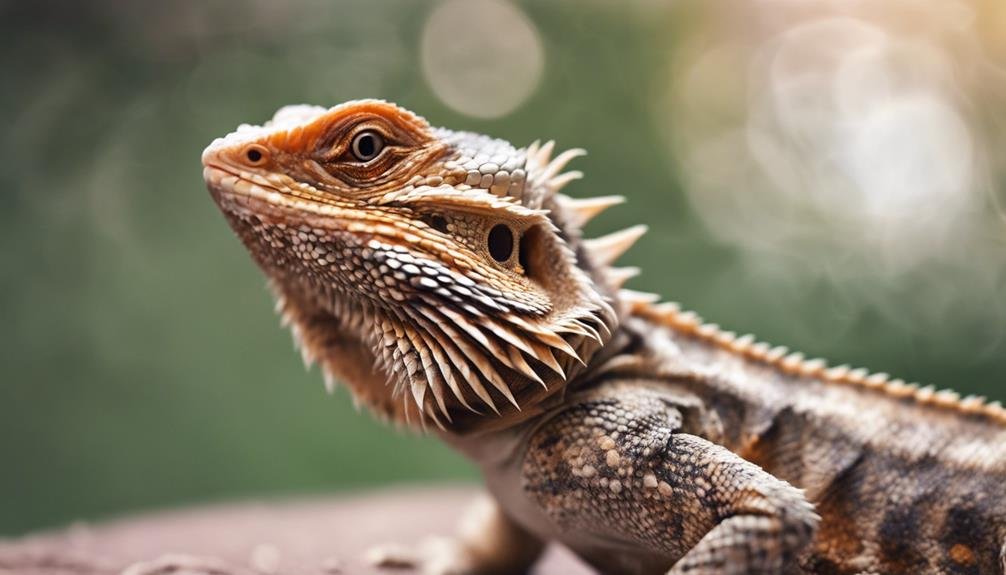

Pinworms can seriously undermine your bearded dragon's health, leading to malnutrition and weakened immunity. These parasitic infections go beyond just being a nuisance; they can trigger a cascade of health issues that affect your pet's quality of life. When pinworms infest your bearded dragon, they don't just sit idly by. They actively harm your dragon's digestive system, leading to weight loss, dehydration, and a host of gastrointestinal disturbances like diarrhea. What's more troubling is that these symptoms can escalate, making your bearded dragon irritable and greatly impacting their overall well-being.
| Symptom | Cause | Effect on Bearded Dragon |
|---|---|---|
| Weight Loss | Malnutrition from pinworms | Reduced energy levels |
| Dehydration | Diarrhea, lack of nutrient absorption | Weakened immune system |
| Irritability | Gastrointestinal disturbances | Reduced quality of life |
Preventative Measures
To safeguard your bearded dragon from pinworm infestations, it's important to adopt effective preventative measures. Keeping your pet healthy and its environment clean are paramount. Consulting with an exotic animal veterinary can offer tailored advice and help establish a preventative care routine, ensuring your bearded dragon stays pinworm-free.
- Quarantine New Reptiles: Before introducing new reptiles to your existing bearded dragons, it's essential to quarantine them. This period allows you to observe the new arrivals for any signs of pinworms or other health issues, preventing the spread of infections.
- Regular Fecal Examinations: Establish a regular schedule for fecal examinations with your exotic animal veterinary. These checks are crucial for early detection of pinworm eggs and can help initiate timely treatment, reducing the risk of an infestation.
- Proper Hygiene Practices: Maintain strict hygiene practices to minimize the risk of pinworm transmission. This includes regular hand washing and sanitizing any tools or materials that come into contact with the bearded dragons.
- Balanced Diet and Husbandry: Ensure you're providing a balanced diet and adhering to proper husbandry practices. A healthy bearded dragon with a strong immune system is less susceptible to pinworms and other health issues.
Cleaning for Prevention
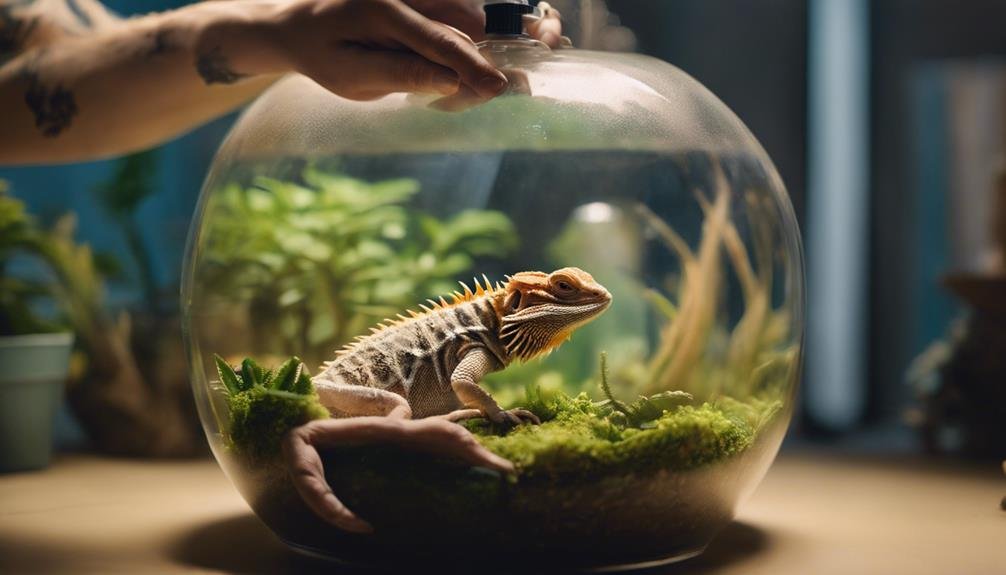

Maintaining a clean environment is crucial for preventing pinworm infestations in your bearded dragon's enclosure. Regular cleaning and disinfection are key to keeping these pesky parasites at bay. It's not just about a quick spot clean; it involves a thorough cleaning routine that guarantees every corner of the habitat is safe and sanitary for your scaly friend.
Here's a simple guide to help you stay on track with your cleaning routine:
| Task | Frequency | Tips |
|---|---|---|
| Remove feces and uneaten food | Daily | Use gloves and dispose of waste properly. |
| Clean and disinfect surfaces | Weekly | Use a reptile-safe cleaner or vinegar-water mixture. |
| Wash accessories | Bi-weekly | Sanitize hides, decorations, and water dishes. |
| Deep clean enclosure | Monthly | Disassemble and thoroughly clean every part. |
When to Consult a Vet
If your bearded dragon's showing signs like lethargy or changes in stool, it's time to consult a vet.
Preventive care through regular check-ups can catch health issues early on.
Don't wait until the symptoms worsen; seeking expert advice is key to your pet's well-being.
Recognizing Severe Symptoms
When your bearded dragon shows signs of lethargy, loss of appetite, or runny stools, it's time to consult a vet promptly. Recognizing these severe symptoms early can be vital in managing a pinworm infestation effectively. By understanding the clinical signs, you guarantee your pet receives the necessary care without delay.
- Severe symptoms to watch for include:
- Significant weight loss indicating a serious health issue.
- Dehydration, which can quickly become life-threatening if not addressed.
- Persistent runny stools or diarrhea, signaling a severe pinworm infection.
- Lethargy and a noticeable decrease in appetite, often the first signs pet owners observe.
Promptly seeking veterinary attention upon noticing these symptoms can greatly improve your bearded dragon's chances of recovery.
Preventive Care Advice
After recognizing severe symptoms in your bearded dragon, it's equally important to focus on preventive care measures and know when to consult a veterinarian. Remember, spotting early signs like lethargy, loss of appetite, or unexpected weight loss necessitates a vet visit. Regular check-ups play a vital role in preventive care, helping catch issues like pinworm infections before they escalate.
| Preventive Measure | When to Consult a Vet |
|---|---|
| Regular veterinary check-ups | Lethargy, loss of appetite, weight loss |
| Clean, hygienic environment maintenance | Changes in behavior or stool consistency |
| Early intervention and guidance | At the first sign of any health concern |
Adhering to these guidelines ensures your bearded dragon remains healthy and pinworm-free.
Recovery and Aftercare
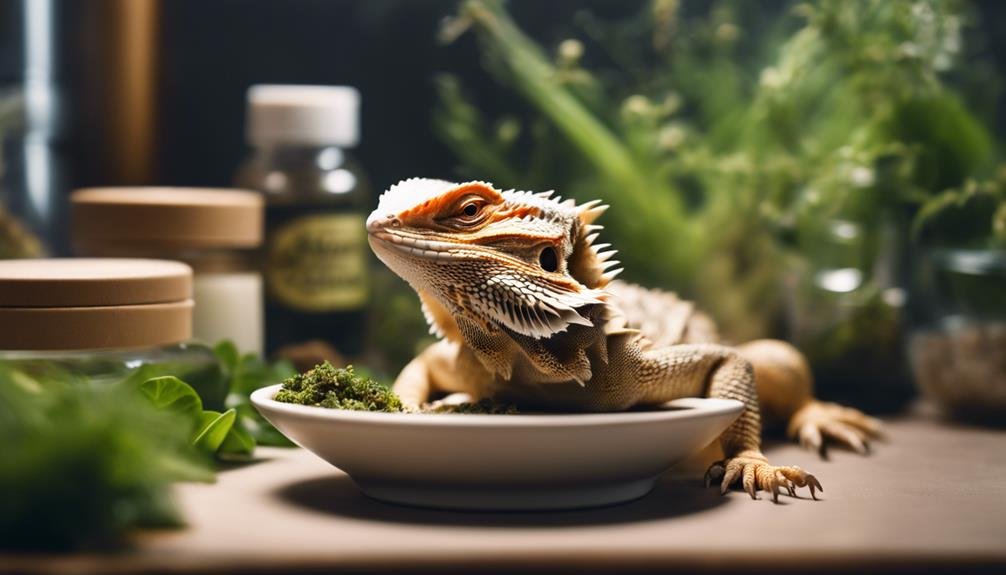

To guarantee a swift recovery for your bearded dragon from pinworm infection, closely monitor them for any signs of returning symptoms or infections. Recovery hinges on your vigilance and the ability to detect early warning signs of a setback. By keeping a close eye on their behavior, appetite, and stool, you can ensure they bounce back as quickly as possible.
During this critical recovery period, prioritize their well-being with these key steps:
- Provide a clean and stress-free environment: A clean habitat reduces the risk of re-infection and supports a healthy recovery.
- Follow up with your veterinarian: Essential for ensuring the pinworms are gone and to address any lingering issues.
- Ensure proper nutrition and hydration: A balanced diet and ample hydration are crucial for helping your bearded dragon regain strength.
- Implement preventive measures: To safeguard against future infections, adhere to practices that maintain your bearded dragon's overall health.
Recovery isn't just about overcoming the immediate threat of pinworms; it's about fortifying your bearded dragon's health against future challenges. By adhering to these guidelines, you're not just helping them recover; you're setting the stage for a healthier, happier life post-infection.
Can Pinworms in Bearded Dragons Cause Them to Flip on Their Backs?
Yes, pinworms in bearded dragons can lead to the bearded dragon flipping behavior. When a bearded dragon is infected with pinworms, it can experience discomfort and irritability, leading to unusual behavior such as flipping on its back. If you notice this flipping behavior, it’s important to consult a reptile veterinarian for proper treatment.
Frequently Asked Questions
What Do Pinworms Actually Look Like?
You're wondering about the microscopic appearance of pinworms, aren't you?
Well, they look like small, white, thread-like worms. When you peer under a microscope, you'll notice their slender form which allows them to navigate through the gastrointestinal tract of bearded dragons.
Their eggs, also visible under magnification, help experts diagnose and treat these pesky parasites. Recognizing them is your first step towards keeping your bearded dragon healthy and pinworm-free.
What Parasites Are Like Pinworms?
You're likely curious about parasites similar to pinworms, especially when comparing them to roundworms. Like pinworms, roundworms are a significant concern in various animals, including reptiles.
Both types of worms live inside the host's intestines, causing symptoms like weight loss and diarrhea if not addressed. However, roundworms are generally larger and can cause more severe health issues.
It's essential to identify and treat these infestations early to keep your pet healthy.
What Bacteria Is Pinworm?
You've got a misconception here; pinworm isn't a bacteria, it's actually a type of nematode, which is a parasitic worm. These little critters specifically target the large intestine in bearded dragons, leading to some nasty symptoms if not dealt with.
They're pretty host-specific, so you don't need to worry about catching them yourself, but your bearded buddy will need a vet's help to kick them out with some anthelmintic medication.
Are Pinworm Eggs in Soil?
Yes, pinworm eggs can indeed be in the soil. When infected reptiles, like bearded dragons, defecate in their environment, they're effectively contaminating the soil with pinworm eggs. These eggs are resilient and can linger in the soil for quite a while.
If your reptile pals go foraging or accidentally ingest some of this soil, they're at risk of picking up pinworms themselves. Keeping their home clean and doing regular poop checks helps prevent this.
Conclusion
To sum up, if you've got a bearded dragon, it's essential to stay vigilant about pinworms. Keep an eye out for symptoms like weight loss and lethargy. Regular fecal exams can catch these parasites early, and traditional treatments or natural remedies can help fight off the infection.
Don't forget, prevention is vital. Keep your dragon's habitat clean and consult a vet if you're unsure. With proper care and attention, your bearded dragon can recover and thrive, pinworm-free.

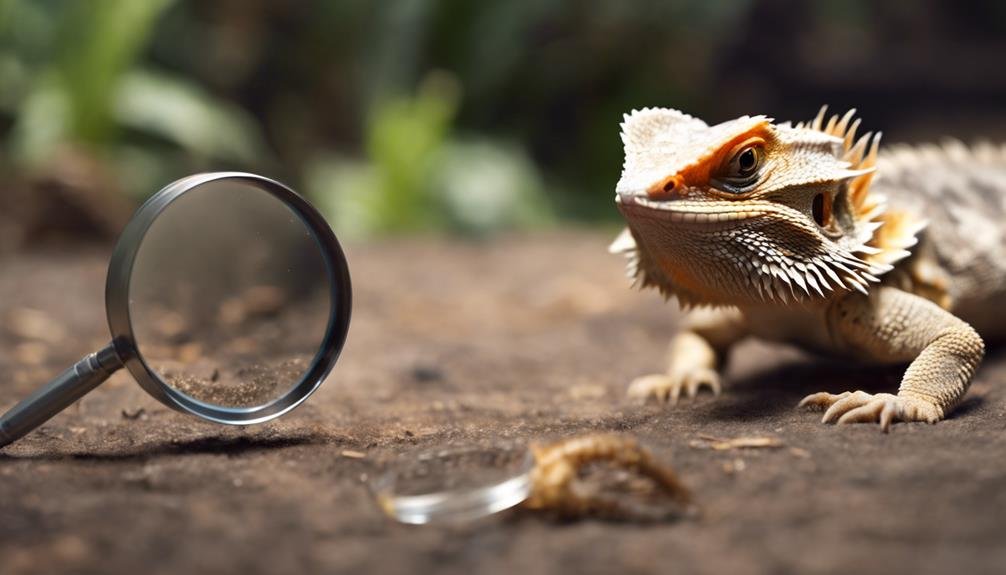

[…] dragons can develop a condition called pinworm in bearded dragons. This can sometimes cause the third eye, or parietal eye, to become swollen and infected. Although […]